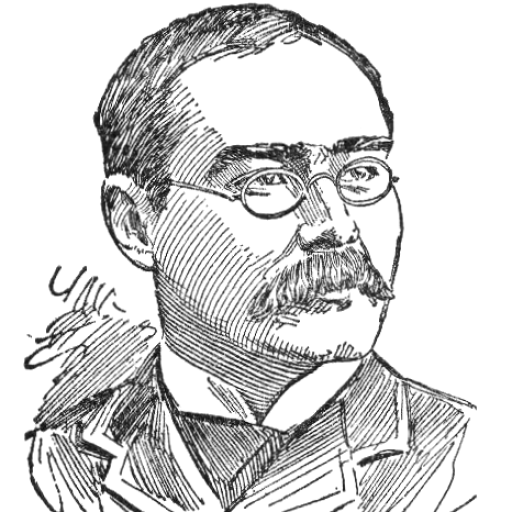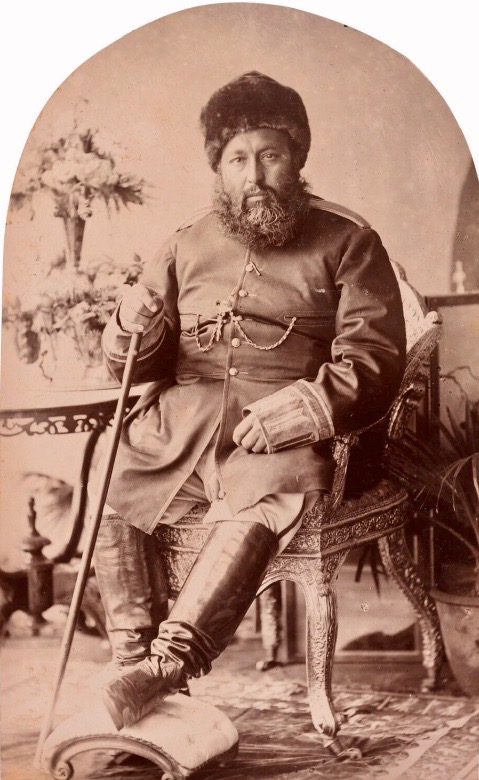‘Tis ill to jest with Kings by day and seek a boon by night …
This is another, darker story about Abdurrahman, “The Iron Emir”, king of Afghanistan from 1880 to 1901, the founder of Afghanistan in its current borders. He seemed larger than life to the British, like Kipling, who lived in India at the time. In the Second Afghan War (1878-81), while the British took the major towns (hence allusions in the poem to “when the big guns speak to the Khyber peak…”, “when the redcoats crawl to the sungar wall…”), the British finally had to withdraw, leaving him in control of Afghanistan.
Throughout the poem are mentioned “The North and the South”, as well as the refrain “from Balkh to Kandahar” (the northernmost and southernmost major cities of Afghanistan) – a reminder of how Abdurrahman united the Tajik region north of the Hindu Kush range with the Pashtun south to form Afghanistan in the borders that we know now. Countries, like people, are not born without blood being spilled. This conquest necessitated a lot of it. It included the forced exile to the North of many Ghilzais – the Pashtun clan that most challenged the supremacy of the Durranis (the clan which included Afghanistan’s royal family, to which Abdurrahman belonged) ‑ hence the repeated mentions of Ghilzais in the poem.
This short episode tells how Abdurrahman got rid of a pretender to the throne by provoking the man to assassinate him, catching him red-handed in the act, sentencing him to a most cruel death, and finally even making the condemned man thank him for it. Whether true or not, the poem portrays an empire-builder: a mixture of ambition, personal courage, cunning and brutality. William the Conqueror, Peter the Great or Cecil Rhodes (a great friend and benefactor of Kipling) would have immediately recognized Abdurrahman as one of them. Even when Kipling mocks Abdurrahman’s “mercy”, his sarcasm is mixed with admiration. Here Kipling assumes with relish the role of the tribal bard, paid to commemorate the exploits of the king or chief, complimenting his audience by addressing them as “Wolves of the Abazai” or “Wolves of the Zukka Kheil”.
The Ballad of the King’s Mercy
Abdhur Rahman, the Durani Chief, of him is the story told. His mercy fills the Khyber hills - his grace is manifold; He has taken toll of the North and the South - his glory reacheth far, And they tell the tale of his charity from Balkh to Kandahar. Before the old Peshawur Gate, where Kurd and Kafir meet, The Governor of Kabul dealt the Justice of the Street, And that was strait as running noose and swift as plunging knife, Tho’ he who held the longer purse might hold the longer life. (1) There was a hound of Hindustan had struck a Yusufzai, (2) Wherefore they spat upon his face and led him out to die. It chanced the King went forth that hour when throat was bared to knife; The Kafir grovelled under-hoof and clamoured for his life. Then said the King: “Have hope, O friend! Yea, Death disgraced is hard. “Much honour shall be thine”; and called the Captain of the Guard, Yar Khan, a bastard of the Blood, so city-babble saith,( 3) And he was honoured of the King - the which is salt to Death; And he was son of Daoud Shah, the Reiver of the Plains (4) And blood of old Durani Lords ran fire in his veins; And ‘twas to tame an Afghan pride nor Hell nor Heaven could bind, The King would make him butcher to a yelping cur of Hind. “Strike!” said the King. “King’s blood art thou - his death shall be his pride!” The louder, that the crowd might catch: “Fear not - his arms are tied!” Yar Khan drew clear the Khyber knife, and struck, and sheathed again. “O man, thy will is done,” quoth he; “A King this dog hath slain.” ( 5) Abdhur Rahman, the Durani Chief, to the North and the South is sold. The North and the South shall open their mouth to a Ghilzai flag unrolled, When the big guns speak to the Khyber peak, and his dog Heratis fly Ye have heard the song - How long? How long? Wolves of the Abazai! The night before the watch was set, when all the streets were clear, The Governor of Kabul spoke: “My King, hast thou no fear? “Thou knowest - thou hast heard,” - his speech died at his master’s face. And grimly said the Afghan King: “I rule the Afghan race. “My path is mine - see thou to thine. To-night upon thy bed ‘Think who there be in Kabul now that clamour for thy head.” That night when all the gates were shut to City and to throne, Within a little garden-house the King lay down alone. Before the sinking of the moon, which is the Night of Night, Yar Khan came softly to the King to make his honour white. (The children of the town had mocked beneath his horse’s hoofs, The harlots of the town had hailed him “butcher!” from their roofs.) But as he groped against the wall, two hands upon him fell, The King behind his shoulder spake: “Dead man, thou does not well! “‘Tis ill to jest with Kings by day and seek a boon by night; “And that thou bearest in thy hand is all too sharp to write. “But three days hence, if God be good, and if thy strength remain, “Thou shalt demand one boon of me and bless me in thy pain. “For I am merciful to all, and most of all to thee. “My butcher of the shambles, rest - no knife has thou for me! Abdhur Rahman, the Durani Chief, holds hard by the South and the North, But the Ghilzai knows, ere the melting snows, when the swollen banks break forth, When the red-coats crawl to the sungar wall, and his Usbeg lances fail: (6) Ye have heard the song - How long? How long? Wolves of the Zukka Kheyl! They stoned him in the rubbish-field when dawn was in the sky, According to the written word, “See that he do not die.” They stoned him till the stones were piled above him on the plain, And those the labouring limbs displaced they tumbled back again. One watched beside the dreary mound that veiled the battered thing, And him the King with laughter called the Herald of the King. It was upon the second night, the night of Ramazan, The watcher leaning earthward heard the message of Yar Khan. From shattered breast through shrivelled lips broke forth the rattling breath, “Creature of God, deliver me from agony of Death.” They sought the King among his girls, and risked their lives thereby: “Protector of the Pitiful, give orders that he die!” “Bid him endure until the day,” a lagging answer came; “The night is short, and he can pray and learn to bless my name.” Before the dawn three times he spoke, and on the day once more: “Creature of God, deliver me, and bless the King therefore!” They shot him at the morning prayer, to ease him of his pain, And when he heard the matchlocks clink, he blessed the King again. Which thing the singers made a song for all the world to sing So that the Outer Seas may know the mercy of the King. Abdhur Rahman, the Durani Chief, of him is the story told, He has opened his mouth to the North and the South, they have stuffed his mouth with gold. Ye know the truth of his tender ruth - and sweet his favours are: Ye have heard the song - how long? How long? - from Balkh to Kandahar.
Notes
[1] Kipling, familiar with the Middle Eastern surrounding, knew that local traders used to keep their money in long pocket-bags tied with many knots to deter thieves. The fact that ability to bribe officials improves in that part of the world one’s chances of survival has unfortunately not changed from Kipling’s time to ours…
[2] The Yusufzais are one of the main Afghan tribes.
[3] Illegitimate son of a member of the royal family, and thus a potential pretender to the throne (remember that William the Conqueror was just such a ‘bastard of the Blood’).
[4] ‘Reiver’ – raider
[5] The fact that Yar Khan referred to himself as ‘King’ and to the King as ‘O man’ shows the extent of his pretentions – and sealed his fate.
[6] ‘Sungar wall’ – fortification.

